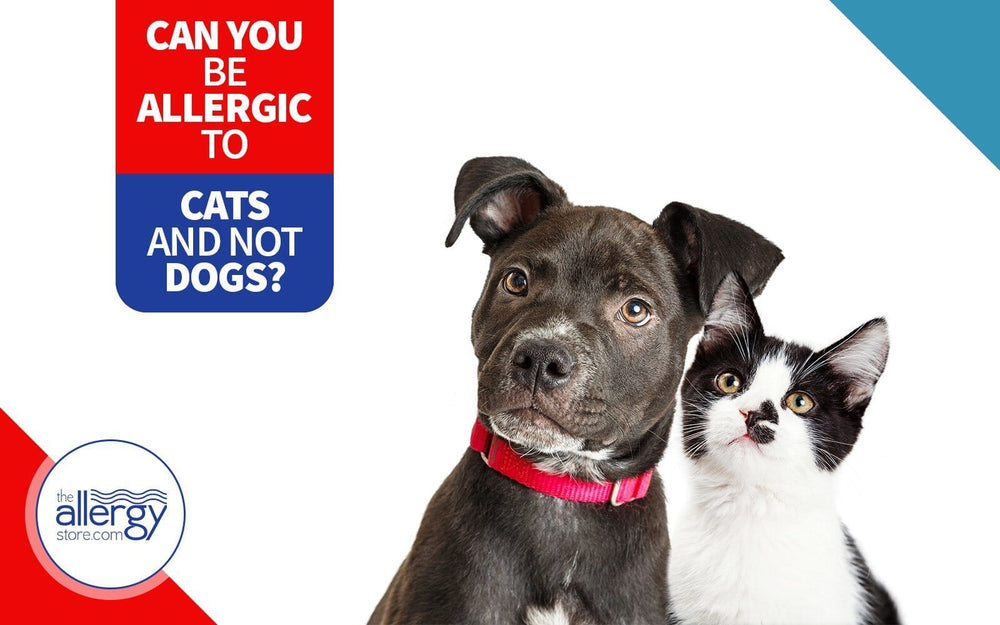
Cat vs. Dog Allergies: Can You Be Allergic to One and Not the Other?
The United States is going to the dogs—and cats, too. According to the World Animal Foundation, about 78 million dogs and 88.2 million cats live in US homes. That means almost 44% of households have a dog, and 37% have a cat. In case you didn’t notice, there are more cats per household than dogs.
That’s an incredible amount of shed fur, skin, and pet dander in our homes. That’s a problem for people with cat or dog allergies. But can you be allergic to one and not the other? Short answer: yes—it depends on which proteins your immune system reacts to.
What Causes Allergies?
Like all allergies, a pet allergy is caused by a confused immune system. The body is exposed to harmless proteins from the environment. Instead of recognizing them as innocent, the immune system mistakenly identifies them as germs and creates antibodies (IgE) to attack them.
Each time you’re exposed, your body “goes to war,” which is why allergies can cause sniffling, sneezing, wheezing, coughing, and itchy or watery eyes. Chronic exposure can also contribute to eczema, ear fluid, or asthma-related inflammation.
What Causes Pet Allergy?
Proteins produced by furred animals cause pet allergies. In cats, the primary allergen is Fel d 1. Cats make this protein in their saliva and sebaceous glands; it coats their skin, transfers to fur, and is also found in urine. Cats also produce albumin, but allergies to that are less common.
Dogs produce Can f 1 in their saliva. Unlike cats, dogs don’t produce the problem protein in their skin, but when they lick their skin or fur, the saliva spreads the protein, coating hair and skin with allergen.
The proteins are different, but the result—symptoms—is similar.
Can You Be Allergic to Cats and Not Dogs?
Yes. You can be allergic to cats and not dogs—or vice versa. However, if you’re allergic to one furred mammal, you’re more likely to react to others (e.g., horses, goats, rabbits) due to similarities among animal proteins.
Reactions vary because animals produce different amounts of allergen. You might react strongly to one cat and only mildly to another dog. Cats often seem “worse” because they both make more Fel d 1 and spend nearly 30% of their time grooming, spreading saliva-based protein across their fur.
Myth-buster: There’s no truly “hypoallergenic” cat or dog. Living animals produce saliva—and therefore allergenic proteins. In the case of cats, skin glands add to the load.
How Do Pet Allergens Spread?
Once allergens leave the animal, they become airborne. They are inhaled or settle on the nearest surface (walls, furniture, clothing, skin). Any disturbance re-aerosolizes them.
If a dog licks you, that’s a direct dose of Can f 1. Dried saliva can flake off toys and pet beds and become airborne. Cat allergen is so light and sticky it’s found in places you wouldn’t expect—hospitals, airplanes—because cat owners carry it on clothes, skin, and hair and shed it everywhere they go. Dog owners do this too, but typically less, since dogs produce lower quantities overall.
Can You Live with Pets If You Have a Pet Allergy?
Often, yes—depending on your sensitivity and how much allergen your pet produces. Studies suggest early-life exposure can shape immune responses, but day to day, control the allergen:
- Vacuum and dust frequently while wearing a mask; use a vacuum with a HEPA filter.
- Keep pets out of the bedroom; wash bedding weekly in hot water.
- Run a properly sized HEPA air purifier in rooms you use most.
- Groom pets regularly. Many owners see relief using Allerpet solutions for cats or dogs.
- If you have carpets, neutralize proteins with proven sprays: Allersearch ADMS and Ecology Works Anti-Allergen Solution.
It’s possible to live with dogs and be allergic to cats, and vice versa. Either way, learning to keep allergen levels down makes a big difference.
This article is for educational purposes and isn’t medical advice. Consult a healthcare professional if you have severe symptoms (wheezing, breathing difficulty).
Wishing you the best of health,
The Allergy Store
Source - World Animal Foundation

